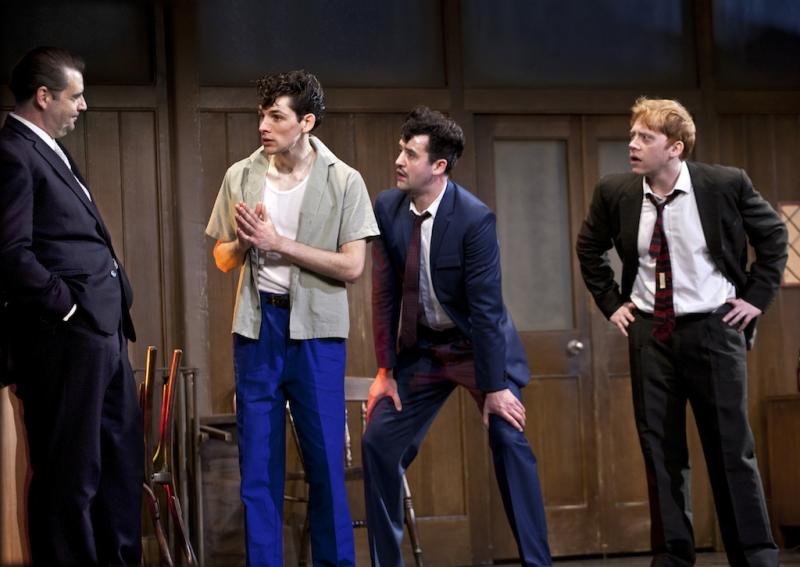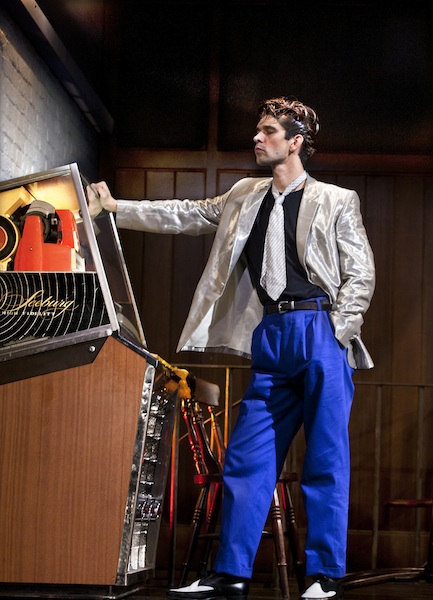Mojo, Harold Pinter Theatre | reviews, news & interviews
Mojo, Harold Pinter Theatre
Mojo, Harold Pinter Theatre
A star-studded production of Jez Butterworth's breakthrough play confirms its status as a contemporary classic

I first saw Mojo as a film, adapted from the stage and directed by its writer Jez Butterworth in 1997. And it really didn’t work. Set in 1950s Soho and involving club owners, gangsters and a wannabe rock & roll star, it tried too hard, felt flashy and stilted; the period proved a graveyard in much the same way as it did for Absolute Beginners a decade before.
How wonderful, then, to see Mojo where it belongs, on stage, with its original director again at the helm and a killer cast that relishes the material. For it truly is a fabulous play, which demonstrates that at 25 Butterworth already possessed the tools that would lead to Jerusalem – the rich, dexterous use of language, the brio, the keen sense of Englishness, a facility to switch between comedy and danger – or to contain them in the same moment – that made the casting of Harold Pinter in the film version so obvious. It’s an original, vibrant, gloriously entertaining piece of work.
It takes place entirely in a Soho club, one which is jumping on the bandwagon of the fledgling music revolution. The play opens in the upstairs office, where silver-suited and suitably quiffed singer Silver Johnny (Tom Rhys Harries) is fine-tuning his strut before going on stage. We can hear the pulsating music below, sense the excitement of his teeny audience; when he rushes down the stairs, the lights go out and the volume’s racked up, the play launches like a take-off at Houston.
With danger outside the door, inside they threaten to destroy themselves We return to the office and a pair of low-level club employees, Potts (Daniel Mays) and Sweets (Rupert Grint), who are waiting expectantly on the results of a meeting behind closed doors. Their boss Ezra is discussing the future of Silver Johnny with Mr Ross, a “flush man”. Potts imagines that since he discovered the singer, he will win a slice of the pie; his sidekick is already swimming in reflected glory. Drinking and popping pills – these characters pop a lot of pills – they could be Vladimir and Estragon, better dressed and with a roof over their heads, but waiting in vain and no less doomed.
Mays and Grint (the latter in his stage debut) make a lovely comedy double act, one darkly quiffed and mustachioed, the other of course ginger; one voluble, smart and ambitious, the other a bit dim. Their scene together is a canny one, lulling us into a false sense of security, before more volatile characters take the stage.
 We will never meet Ezra. Overnight the life of the club is turned inside out and his staff, including right-hand man Mickey (Brendan Coyle), Skinny (Colin Morgan) and Ezra’s son Baby (Ben Whishaw, pictured right) find themselves under siege. With danger outside the door, inside they threaten to destroy themselves, the temperature raised in particular by the sexual tension between Baby, who may well be a psychopath, and Skinny, who really shouldn’t be copying Baby’s wardrobe.
We will never meet Ezra. Overnight the life of the club is turned inside out and his staff, including right-hand man Mickey (Brendan Coyle), Skinny (Colin Morgan) and Ezra’s son Baby (Ben Whishaw, pictured right) find themselves under siege. With danger outside the door, inside they threaten to destroy themselves, the temperature raised in particular by the sexual tension between Baby, who may well be a psychopath, and Skinny, who really shouldn’t be copying Baby’s wardrobe.
Director and long-term Butterworth collaborator Ian Rickson has the knack (and restraint) to stage the plays in such a way that allows the language and characters to weave a spell unencumbered by undue theatricality.
Ably assisted by designer Ultz, he captures the milieu with deceptive simplicity – the first half taking place in a workaday office whose only notably objects are not one but three jukeboxes, the second in the club below, the two floors connected in our minds by a spiral staircase that the actors glide up and down in a way that is worth a hundred workouts. Soho is evoked by morning light pouring through the shutters, or by the text itself – Baby’s observation of “a Buick in Dean Street” speaks volumes.
The production is chock full of star power. It’s some event when you can reference James Bond (Whishaw’s Q), Harry Potter (Grint), Downton Abbey (Coyle) and Merlin (Morgan) together on the London stage. Get past the novelty, and one finds a cracking ensemble.
When Baby demands that the other man “Kiss my pegs” you don’t know whether to laugh or run for the hills Whishaw bristles with menace as Baby, whose taunting of Morgan’s scheming and possibly lovestruck Skinny provides some of the play’s most outrageous moments – not least when the lights come up to a chaotic party binge, Skinny tied to a juke box with his trousers around his ankles and Baby brandishing a cutlass before him. When Baby demands that the other man “Kiss my pegs” you don’t know whether to laugh or run for the hills.
Grint acquits himself well, although I’d welcome the day when he gets to play a character like Baby. And Coyle’s familiar world weariness anchors the action. But Mays is the stand-out, a revelation even as the motormouth, vainglorious, ultimately pathetic Potts. He’s incredibly funny, combining finely-honed physical comedy with a delicious attack on the words.
And Potts gets many of the best lines, among them a sigh of dawn despair as this bravura tale of young men caught between rock & roll rebellion and old school villainy enters its final stretch. “I’ve had nothing but sorrow and birthday cake since sun up. So stop the music hall.”
- Mojo at The Harold Pinter Theatre to 25 January 2014
rating
Share this article
The future of Arts Journalism
You can stop theartsdesk.com closing!
We urgently need financing to survive. Our fundraising drive has thus far raised £49,000 but we need to reach £100,000 or we will be forced to close. Please contribute here: https://gofund.me/c3f6033d
And if you can forward this information to anyone who might assist, we’d be grateful.

Subscribe to theartsdesk.com
Thank you for continuing to read our work on theartsdesk.com. For unlimited access to every article in its entirety, including our archive of more than 15,000 pieces, we're asking for £5 per month or £40 per year. We feel it's a very good deal, and hope you do too.
To take a subscription now simply click here.
And if you're looking for that extra gift for a friend or family member, why not treat them to a theartsdesk.com gift subscription?
more Theatre
 The Line of Beauty, Almeida Theatre review - the 80s revisited in theatrically ravishing form
Alan Hollinghurst novel is cunningly filleted, very finely acted
The Line of Beauty, Almeida Theatre review - the 80s revisited in theatrically ravishing form
Alan Hollinghurst novel is cunningly filleted, very finely acted
 Wendy & Peter Pan, Barbican Theatre review - mixed bag of panto and comic play, turned up to 11
The RSC adaptation is aimed at children, though all will thrill to its spectacle
Wendy & Peter Pan, Barbican Theatre review - mixed bag of panto and comic play, turned up to 11
The RSC adaptation is aimed at children, though all will thrill to its spectacle
 Hedda, Orange Tree Theatre review - a monument reimagined, perhaps even improved
Scandinavian masterpiece transplanted into a London reeling from the ravages of war
Hedda, Orange Tree Theatre review - a monument reimagined, perhaps even improved
Scandinavian masterpiece transplanted into a London reeling from the ravages of war
 The Assembled Parties, Hampstead review - a rarity, a well-made play delivered straight
Witty but poignant tribute to the strength of family ties as all around disintegrates
The Assembled Parties, Hampstead review - a rarity, a well-made play delivered straight
Witty but poignant tribute to the strength of family ties as all around disintegrates
 Mary Page Marlowe, Old Vic review - a starry portrait of a splintered life
Tracy Letts's Off Broadway play makes a shimmeringly powerful London debut
Mary Page Marlowe, Old Vic review - a starry portrait of a splintered life
Tracy Letts's Off Broadway play makes a shimmeringly powerful London debut
 Little Brother, Soho Theatre review - light, bright but emotionally true
This Verity Bargate Award-winning dramedy is entertaining as well as thought provoking
Little Brother, Soho Theatre review - light, bright but emotionally true
This Verity Bargate Award-winning dramedy is entertaining as well as thought provoking
 The Unbelievers, Royal Court Theatre - grimly compelling, powerfully performed
Nick Payne's new play is amongst his best
The Unbelievers, Royal Court Theatre - grimly compelling, powerfully performed
Nick Payne's new play is amongst his best
 The Maids, Donmar Warehouse review - vibrant cast lost in a spectacular-looking fever dream
Kip Williams revises Genet, with little gained in the update except eye-popping visuals
The Maids, Donmar Warehouse review - vibrant cast lost in a spectacular-looking fever dream
Kip Williams revises Genet, with little gained in the update except eye-popping visuals
 Ragdoll, Jermyn Street Theatre review - compelling and emotionally truthful
Katherine Moar returns with a Patty Hearst-inspired follow up to her debut hit 'Farm Hall'
Ragdoll, Jermyn Street Theatre review - compelling and emotionally truthful
Katherine Moar returns with a Patty Hearst-inspired follow up to her debut hit 'Farm Hall'
 Troilus and Cressida, Globe Theatre review - a 'problem play' with added problems
Raucous and carnivalesque, but also ugly and incomprehensible
Troilus and Cressida, Globe Theatre review - a 'problem play' with added problems
Raucous and carnivalesque, but also ugly and incomprehensible
 Clarkston, Trafalgar Theatre review - two lads on a road to nowhere
Netflix star, Joe Locke, is the selling point of a production that needs one
Clarkston, Trafalgar Theatre review - two lads on a road to nowhere
Netflix star, Joe Locke, is the selling point of a production that needs one
 Ghost Stories, Peacock Theatre review - spirited staging but short on scares
Impressive spectacle saves an ageing show in an unsuitable venue
Ghost Stories, Peacock Theatre review - spirited staging but short on scares
Impressive spectacle saves an ageing show in an unsuitable venue

Add comment